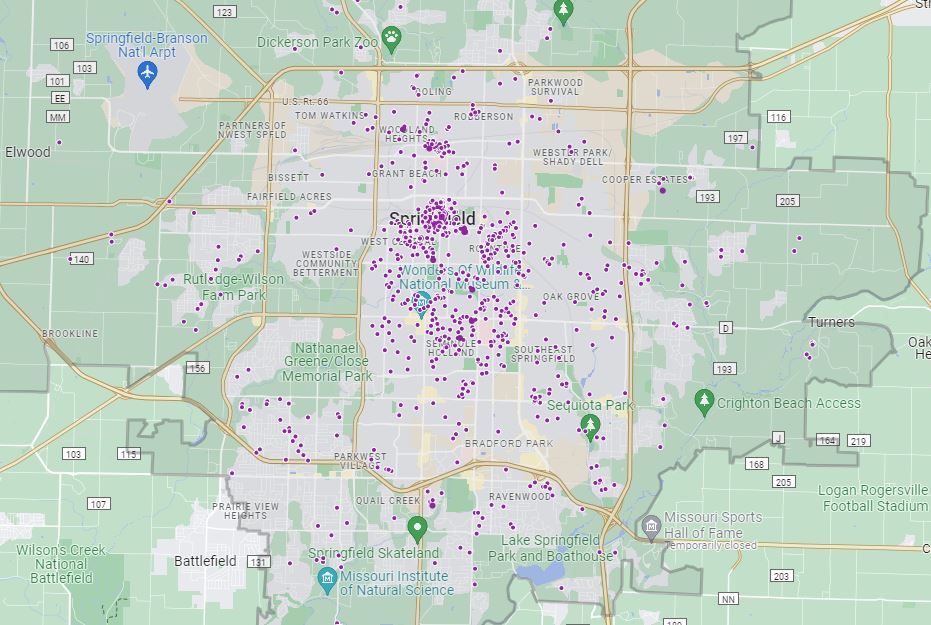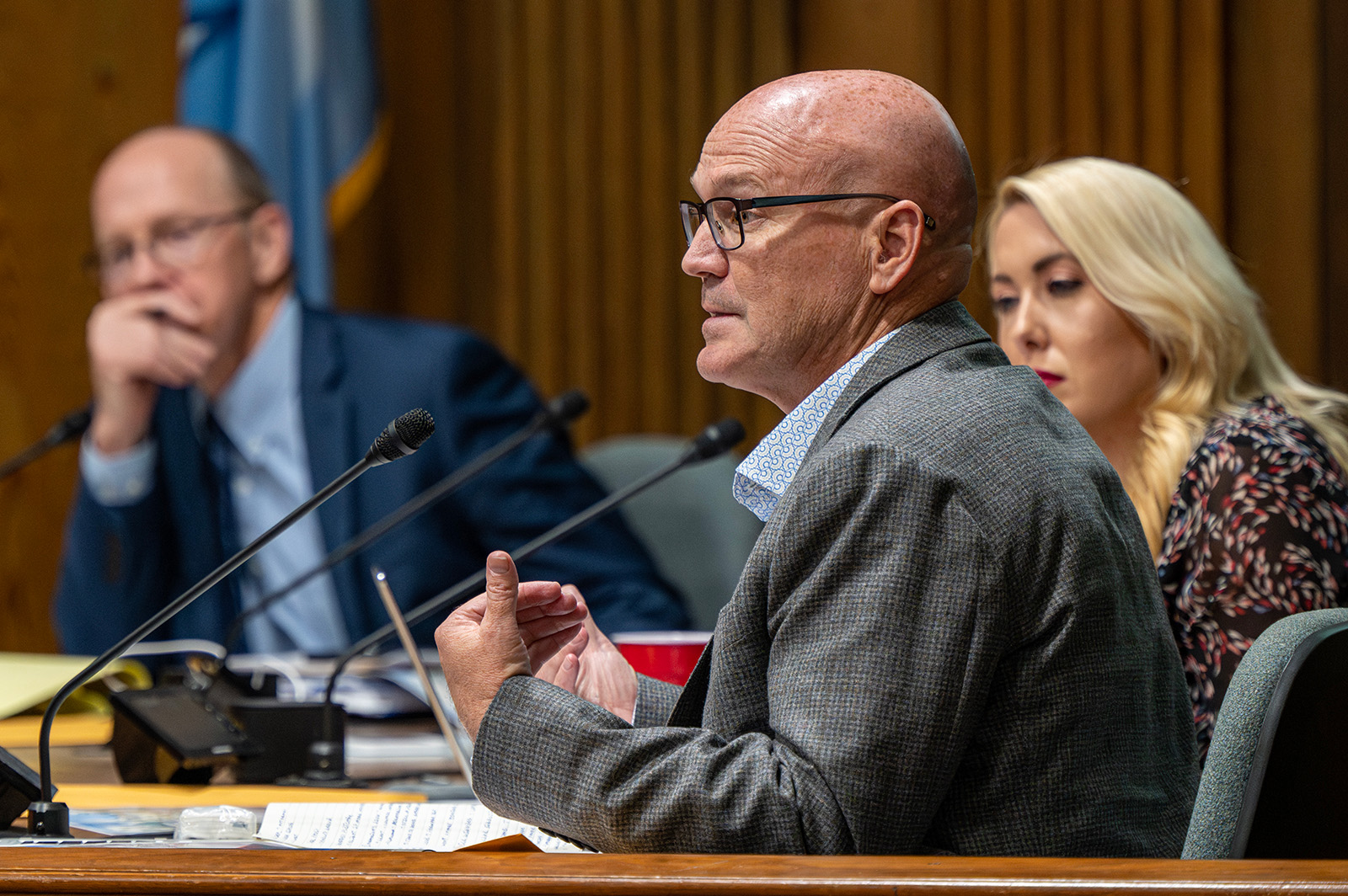As unlicensed Airbnb and VRBO rental units face a reckoning, so too could Springfield’s short-term rental ordinance.
Passed in 2019, the ordinance established a process for Springfield property owners to rent out their homes to guests. However, unlicensed short-term rental properties have sprung up all over town, making up more than half of the Springfield short-term rental market.
Of 651 identified short-term rentals in Springfield, only 292 are licensed. Even fewer short-term rental operators are paying the 5% room tax approved by Springfield voters in 2023; approximately 53% of the licensed rentals are being reported for each tax period, according to a memo from the Springfield Finance Department to the City Council.
The Springfield City Council referred the topic of short-term rentals — which often sets off debate at City Council meetings — to the Plans and Policies Committee. Comprised of council members Abe McGull, Callie Carroll, Craig Hosmer and Derek Lee, the committee deliberated over the city’s short-term rental ordinance, and the new measures being taken to enforce them at its March 6 meeting.
More about Springfield's short-term rental laws

Springfield’s short-term rental ordinance, which can now be found in Section 36-473 of the city’s Code of Ordinances, categorized rentals into types 1, 2 and 3.
Typically listed as “private rooms” or accessible through private entrances, type 1 short-term rentals must primarily be owner-occupied residences. Type 2 short-term rentals, the most common type in Springfield, are not owner-occupied residences. Type 3 short-term rentals located outside of single-family or residential townhouse zoning.
An awkward zoning process
Though each type has a host of requirements, including obtaining an annual business license, type 2 rentals have the most involved application process. In addition to holding a neighborhood meeting, applicants must provide signatures from at least 55% of adjacent property owners.

City Manager Jason Gage described collecting signatures as an “awkward process” for applicants due to the lack of participation from surrounding property owners, which can easily throw off the total percentage.
If property owners are unable to collect the signatures — whether due to opposition from neighbors or the inability to contact the property owners — the applicant can appeal to the City Council for final approval. Since the short-term rental regulations were adopted, 27 appeals have come before the City Council, according to Planning Manager Bob Hosmer.
The appeals routinely spark debate among council members, particularly Craig Hosmer, who has been especially critical of the proliferation of unlicensed short-term rentals across Springfield.

“When we get elected, the people that don’t vote, I don’t assume they voted with me,” Hosmer said.
Up until now, enforcement of the city's short-term rental ordinance has been challenging because platforms like Airbnb and VRBO don’t provide addresses for listed properties until the rental unit has been booked.
What’s being done to reign in unlicensed short-term rentals
In order to get a grasp on the prevalence of unlicensed short-term rentals in Springfield, the city hired Deckard Technologies in November 2023. Through the company’s short-term rental monitoring platform RentalScape, the city will be able to identify unlicensed short-term rentals and begin bringing properties into compliance. The new enforcement system will be in place “very quickly,” according to Gage.
The city government will first send “demand letters” requiring property owners to provide payment of back taxes and cease operations of unlicensed short-term rentals until the properties are registered.

Owners of licensed short-term rentals who fail to pay the hotel/motel tax within 30 days will have their licenses revoked, and owners of unlicensed short-term rentals who fail to register their property and continue to operate the rental will face prosecution in municipal court.
In addition, RentalScape will provide real-time reporting of new listings in Springfield, set up online portals for short-term rental registration and payment of the city’s hotel/motel tax and a 24/7 hotline and online complaint form.
Though committee members were in agreement of the need for better compliance with the city’s short-term rental ordinance, and were encouraged by the new enforcement measures, they weren’t unanimous in their overall opinion of short-term rentals and the codes regulating them.
Inspiration borrowed from Kansas City
In considering changes to Springfield’s current short-term rental laws — which were partially modeled after Kansas City’s — officials in Springfield are again turning to Kansas City for ideas.
Councilmember Craig Hosmer advocated for Springfield to similarly require booking platforms to delist unlicensed short-term rentals, something he said should’ve been done “a long time ago.”
“I'm not sure how a city tells the national company — and they may be able to do that, and I think if they can do that, we need to incorporate that,” Gage said. “I totally agree we need to incorporate that. I don't know how successful they are; we need to investigate that and talk to them and research it and see how effective that is.”
Gage suggested the City Council consider changing the city’s blockface requirements, which currently allow one type 2 short-term rental for every eight residences on one side of a street between two intersections.
“When we think about either before the medical marijuana or the recreational now, there's different types of separation in the community area…we don't have that kind of separation with these, it’s just looking at the blockface,” Gage said. “So it's so it's more localized look at separation, it’s not the broader look.”
Committee members argue pros and cons of short-term rentals

Hosmer is primarily at odds with type 2 short-term rentals, and again pointed to Kansas City, which no longer allows short-term rentals that aren’t a property owner’s primary residence to operate on residentially-zoned property.
“We have a housing shortage in the city of Springfield, and we keep incentivizing people to take housing out of homeownership,” he said.
Councilmember Carroll, however, contends that short-term rentals don’t necessarily cause less homeownership, and suggested that property owners would turn their properties into regular rental units if the city limited short-term rentals, which she said are “the nicest looking house on the block in a lot of these cases.”

“I think we would just have more rentals,” Carroll said. “And historically those are the ones that are causing more of the problems in Springfield.”
Though supportive of upping enforcement and open to recommending changes to the whole of the City Council, Lee said the city’s short-term rental regulations “are good the way they are.”
“I have no problems adding your suggestion to the list and voting in favor of that,” Lee told Hosmer. “I also have no problems if you have some specific things, like you want to do away with them in single family residences. I'll support that going to Council for a vote, but I personally am going to vote against that because I think it's valuable. I personally do that in other communities.”

McGull emphasized that Springfield now has a “vested interest” in short-term rentals under the hotel/motel tax code, and said that doing away with type 2 rentals would negatively impact residents who have used “this opportunity to generate additional income for themselves.”
The Plans and Policies Committee will continue debating short-term rental policies at its April 10 meeting as the city government continues working with RentalScape.

